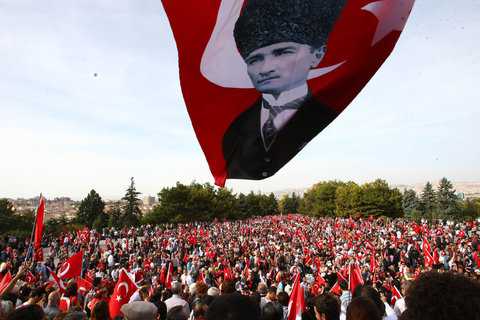
Adem Altan/Agence France-Presse — Getty Images
A Turkish flag with the portrait of Turkey’s founder, Mustafa Kemal Ataturk, floats above thousands of people celebrating Republic Day in Ankara on Oct. 29, 2012.
ISTANBUL — “How happy is the one who says ‘I am a Turk,’” said Mustafa Kemal Ataturk, speaking in an emotional finale of a speech in 1933 — a time when Turkey was still trying to forge a national identity out of the ruins of the Ottoman Empire. The notion seemed simple enough: If you think you’re Turkish, then you are.
Of course, it’s not that straightforward. On the one hand, Article 66 of the 1982 Constitution defines a Turk as someone who feels the bonds and benefits of citizenship rather than in terms of ethnicity or race. On the other hand, Article 3 states that Turkish is the country’s sole official language, and Article 24 makes religious education compulsory. Throughout the document, as well as in political discourse and popular parlance, the notion of “Turkishness” is both ill-defined and staunchly defended.
This is a problem especially because the 1982 Constitution, written while Turkey was under martial law, is infamously a charter for authoritarianism: It is designed to defend the ideological core of the state, not individual rights.
Turkish officialdom has found it almost impossible to accept that non-Muslims like Armenians and Jews could be loyal to the state. But with non-Muslims accounting for just 0.5 percent Turkey’s population, discrimination against them has been, in effect, a minor issue. The real problem is the Kurds. They are Muslim, yes, but many insist on an identity of their own, and there are too many of them — 18 percent of the population, according to one estimate — to ignore.
During the last election the government pledged to change this, and it is now hammering out a new Constitution. The stakes are high: This is happening as Prime Minister Recep Tayyip Erdogan tries to end a long campaign by Kurdish nationalists, sometimes peaceful and sometimes not, calling for a devolution of power and the right to think of themselves not as Turks but as Kurds.
The Kurds, reasonably, are asking that the expression of their cultural difference no longer be interpreted as an attack on the integrity of the state. So the Constitution’s protections for “Turkishness” have to go.
But this push leaves many who are happy to call themselves Turks otherwise miserable. Some 300 prominent intellectuals have signed a declaration protesting any attempt to expunge reference to the republic’s Turkish character. They claim the deletion would threaten the nation-state founded by Ataturk, “which represents the uninterrupted sovereignty of the Turkish nation in Anatolia beginning with the Seljuks and continuing under the Ottomans.” This is an old guard defending an outdated national myth, but they represent a powerful force — some journalists have likened them to the 300 Spartans holding out at Thermopylae.
Even pro-government columnists who support revisions to the Constitution are complaining about an ambient “allergy to Turkishness.” If we can “make reference to Kurdish intellectuals, Kurdish people and Kurdish issue, why should we avoid using the notion of Turk?” This makes logical sense, but a more sympathetic and perhaps more historically minded view is that Kurdish nationalism, its excesses included, was a response to Turkish nationalism.
Ataturk, in short, did too good a job of unifying his young republic around the idea of Turkishness. The country today needs another rallying cry.
President Abdullah Gul recently suggested a sensible approach. Although he sits in an office whose symbol is an emblem with 16 stars, each representing one historic Turkish kingdom — arguably an expression of Turkishness that teeters on the hubristic — he said that it wasn’t the business of a constitution to define the identity of its citizens.
The Ottoman Empire may have been a Turkish state, he said, “but that didn’t mean every single one of its citizens was a Turk.” Taking pride in your country is a good thing, but it is something you do out of choice.
Andrew Finkel has been a foreign correspondent in Istanbul for over 20 years, as well as a columnist for Turkish-language newspapers. He is the author of the book “Turkey: What Everyone Needs to Know.”
via Why the Vagueness of “Turkishness” Holds Back Turkey’s Kurds – NYTimes.com.

Leave a Reply